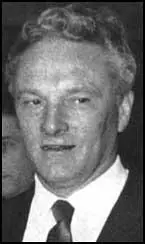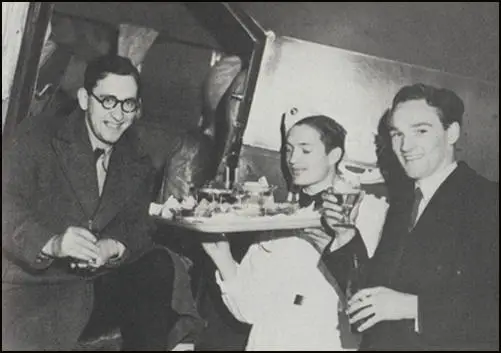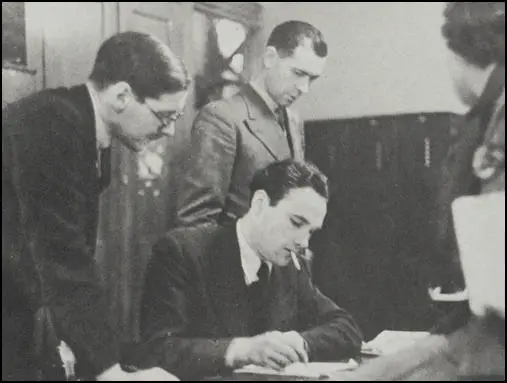Hugh Cudlipp

Hugh Cuddlip, the son of a commercial traveller, was born in Cardiff on 28th August, 1913. After leaving school at fourteen, he became a junior reporter on the local Penarth News. His career progress was swift. At fifteen he was a reporter on the Cardiff Evening Express, at sixteen a reporter on the Manchester Evening Chronicle, at seventeen a sub-editor on the newspaper and at nineteen features editor of the Sunday Chronicle.
Cuddlip joined the Daily Mirror as assistant features editor in 1935. The two most important figures at the newspaper, H. G. Bartholomew, the editorial director, and Cecil King, the advertising director, soon recognised Cudlipp's abilities. Six months after arriving at the Daily Mirror, Cudlipp, now aged twenty-one, replaced his former boss, Basil Nicholson, as features editor.
In the 1930s Cudlipp, H. G. Bartholomew, Cecil King and William Connor, who wrote under the name of Cassandra, helped to develop a new type of brash, social reforming, anti-establishment newspaper. King, who considered Cudlipp "the finest journalist in the country" appointed him as editor of the Sunday Pictorial in 1938. The newspaper had been losing readers since its high point of sales of two and a half million in 1925. Just before Cudlipp arrived circulation had fallen to a million and a quarter. Over the next few months Cudlipp changed it from a right-wing organ to a crusading newspaper with a social conscience.
Whereas newspapers such as the Daily Mail and the Evening News had given support to the right-wing governments in Germany, Italy and Spain, Cudlipp ensured that human right violations in these countries were reported. Along with the Daily Mirror, the Sunday Pictorial consistently exposed the image of a harmless Adolf Hitler put out by those newspapers sympathetic to fascism.

In July 1938 Hugh Cudlipp and Cecil King visited Winston Churchill at his home in Kent when together they planned the attack on Neville Chamberlain and his policy of appeasement. The result was that the following month there was a series of articles by Churchill in the Daily Mirror. In one article Churchill warned that the "unaccountable delay - whoever is to blame for it - in concluding an all-in alliance between Britain, France and Russia, increases the danger of a wrong decision by Herr Hitler."
Cudlipp upset many people in the Conservative Party with his attacks on the Chamberlain government, and in December, 1940, Quintin Hogg, asked in the House of Commons "Why Mr. Hugh Cudlipp, aged about twenty-seven years and editor of the Sunday Pictorial, had not been called up for military service." Ernest Bevin, the Minister of Labour in Churchill's government explained that both Cudlipp's employers and the Ministry of Labour had requested that he should be allowed to continue with his journalism. In fact, Cudlipp had already asked the Ministry of Information to be taken off the reserve list and had already applied to join the British Army.

After the war Cudlipp returned to the Sunday Pictorial, but was sacked after a dispute with H. G. Bartholomew in December, 1948. Lord Beaverbrook, had been waiting for this opportunity and promptly employed Cudlipp on the Sunday Express. Cecil King was furious when he heard the news, and he joined up with fellow director, Philip Zec, to remove Bartholomew as editorial director. Soon afterwards, Cudlipp was brought back as editor of the Sunday Pictorial, and later as editorial director of the Daily Mirror Newspapers Group. He published the book, Publish and be Damned: The Astonishing Story of the Daily Mirror, in 1953.
Cudlipp and King ensured that the Daily Mirror remained a loyal supporter of the Labour Party. During the investigations of Royal Commission on the Press in June, 1961, Cecil King admitted that Cudlipp and himself decided the editorial strategy of the Mirror Group. Cudlipp added that: "Mr. King and I meet frequently; we know each other's minds and the policies of our papers have been settled for many years."
Cudlipp served as Chairman of the Mirror Group (1963-1967) and Chairman of the International Publishing Corporation (1968-1973). On his retirement he was created Baron Cudlipp, of Aldingbourne. His autobiography, Walking on the Water, was published in 1976.
Hugh Cudlipp died on 17th May 1998.
Primary Sources
(1) Quintin Hogg, the MP for Oxford asked a question in the House of Commons about Hugh Cudlipp (4th December, 1940)
Why Mr. Hugh Cudlipp, aged about twenty-seven years and editor of the Sunday Pictorial, had not been called up for military service; and whether steps would be taken to see that any advantage granted to him was removed in order to secure the equal operation of the Military Service Acts.
(2) On 26th June 1961, Cecil King was interviewed by the Royal Commission on the Press on how editorial policy of the Daily Mirror was decided.
I would say that on editorial policy Hugh Cudlipp and I, who have been directors together for very many years, work closely and are in general agreement on what sort of line we are going to take. I suppose I see him very nearly every day, and if anything fresh crops up we decide what we are going to do, but I very rarely see the editors. He sees the editors and the editors are responsible to him.
(3) On 26th June 1961, Hugh Cudlipp was interviewed by the Royal Commission on the Press on how editorial policy of the Daily Mirror was decided.
Mr. King and I meet frequently; we know each other's minds and the policies of our papers have been settled for very many years; we're not suddenly going to be Right wing instead of Left Wing, or unilateralists instead of multilateralists.
When Vicky drew cartoons for us, I can't remember a single occasion on which he agreed with the policy of the paper, and Cassandra, might be miles away from it, but both are given freedom of action.
